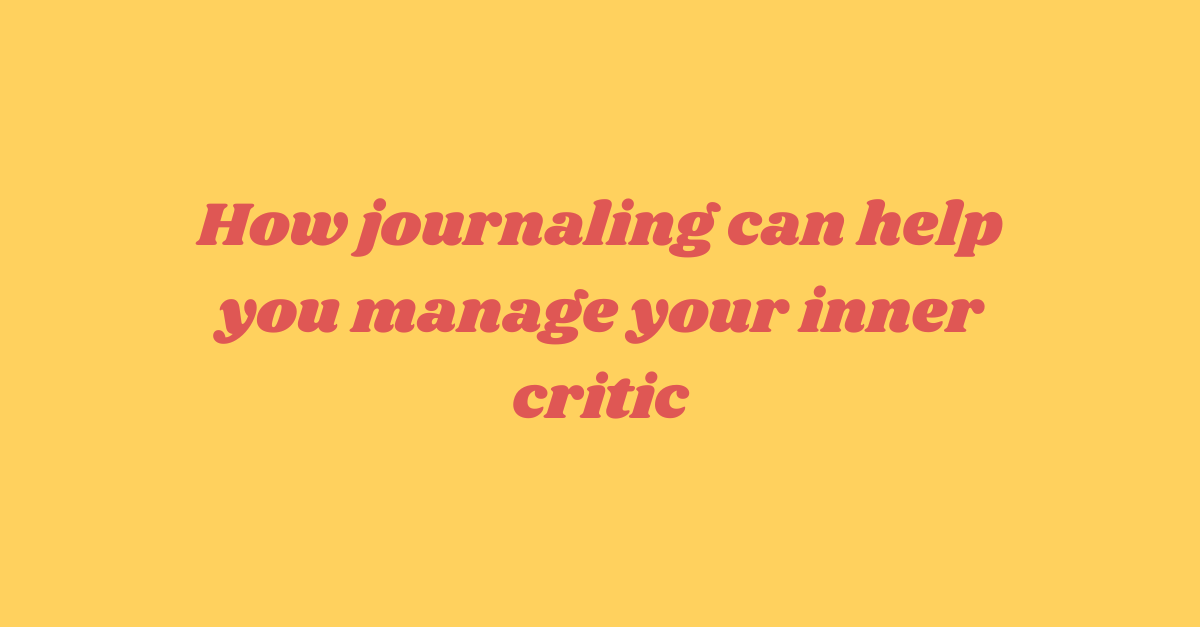If you’ve read our newsletter or seen our social posts, you probably know that we’re lowkey obsessed with journaling. And it’s not just because we love pretty stationery.
Journaling has been scientifically proven to improve our mood, reduce stress levels and help with depressive symptoms. Some studies have shown that it can even increase our chances of fighting off illness and disease.
And when it comes to a loud inner critic, journaling is one of the best strategies to get that voice to quieten down.
Here’s why.
1. Journaling helps you externalise your inner critic.
We’ve spoken before about how naming your inner critic can be a great way to identify and externalise its narrative. The same idea applies to journaling.
If you write down the things your inner critic is telling you, seeing them in black and white on the page can help you be much more objective. This is the first step to taking back some of its power and not letting it rule your life.
2. Journaling helps you understand your inner critic.
Our inner critic doesn’t come out of nowhere. Its voice is shaped really early on in our lives, through our responses to our primary caregivers (read this post to learn more).
And actually, once we get to the bottom of why our inner critic says the things it does, we usually find there’s a method to its madness.
Journaling can help us see the underlying intention behind our inner critic more clearly. Often, we realise that it’s trying to help, motivate or protect us.
Try this exercise
Think about a time when something has gone well for you. It could be a new job, a promotion, or a compliment from a friend.
Pay attention to what your inner critic told you in the lead up to this. Although it may not have felt like a helpful narrative at the time, notice how it helped you and how it didn’t.
Once we understand this, we can work on building a relationship with our inner critic. Which can feel like having to sit next to that person you really don’t like at a dinner part, but trust us—it works!
Because as much as we like telling Russell to f*ck off, sometimes he needs a bit of empathy and reassurance too.
3. Journaling helps you have a dialogue with your inner critic.
PSA: talking to yourself is really healthy. But if you don’t fancy doing it on the tube, journaling is a good option.
Having conversations with your inner critic means you can challenge the things it’s saying, so that they hold less weight in your mind.
Try this exercise
Write down your inner critic’s narrative and then factually dispute the things it’s saying. For example, if your inner critic says you’re sh*t at your job, write down three things which indicate otherwise (some positive feedback from a client, your last promotion or pay rise, etc.).
Use different columns or pages in your journal to separate your inner critic’s narrative from reality. Visualising the contrast can work wonders.
4. Journaling helps you strengthen your inner kindness.
Move over, inner critic. There’s another internal narrative in town.
While it’s impossible to get rid of your inner critic completely, the good news is that you can call on your inner kindness to drown out some of the noise.
Making a practice of writing from a place of self-compassion is a great way to strengthen the voice of your inner kindness. As in the exercise above, you can use the voice of your inner kindness to gently challenge the things your inner critic is saying.
Give it a try
If you’re feeling any feelings about the week ahead, why not grab your journal and try some of these prompts? We’d love to hear how you get on—or if you’ve got any journaling practices of your own that you’d like to share.
Need more reasons to invest in cute notepads? We’re always sharing journaling prompts to help you manage your inner critic. Subscribe to get them delivered straight to your inbox.







